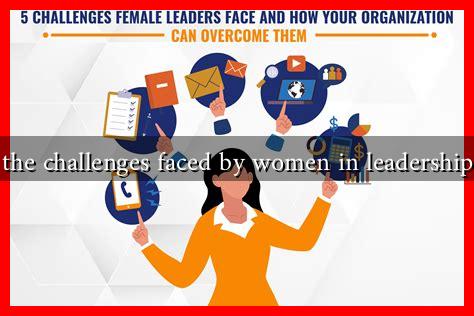-
Table of Contents
What are the Challenges Faced by Women in Leadership Positions?
Women have made significant strides in leadership roles across various sectors, yet they continue to face a myriad of challenges that hinder their progress. Despite the growing recognition of the importance of diversity in leadership, systemic barriers and societal expectations often impede women’s advancement. This article explores the multifaceted challenges women encounter in leadership positions, supported by relevant examples, statistics, and case studies.
1. Gender Bias and Stereotypes
One of the most pervasive challenges women face in leadership is gender bias. Stereotypes about women’s capabilities and roles can significantly impact their career trajectories. Research indicates that women are often perceived as less competent than their male counterparts, regardless of their qualifications or achievements.
- Double Standards: Women leaders are frequently judged more harshly than men for the same behaviors. For instance, assertiveness in women may be labeled as aggressive, while the same trait in men is often seen as a sign of strong leadership.
- Leadership Styles: Traditional leadership styles are often male-dominated, leading to a perception that women must adopt masculine traits to succeed, which can create internal conflict and stress.
2. Work-Life Balance Challenges
Balancing professional responsibilities with personal life is another significant hurdle for women in leadership. The expectation to fulfill both roles can lead to stress and burnout.
- Family Responsibilities: Women are often expected to take on the majority of household and caregiving duties, which can limit their availability for work-related commitments.
- Flexible Work Arrangements: While some organizations have adopted flexible work policies, many women still find it challenging to negotiate these arrangements without facing stigma or backlash.
3. Lack of Mentorship and Sponsorship
Mentorship and sponsorship are crucial for career advancement, yet women often have less access to these resources compared to men. A study by McKinsey & Company found that women are less likely to have a sponsor who can advocate for them in high-stakes situations.
- Networking Opportunities: Women may find it more challenging to network in male-dominated industries, which can limit their access to influential contacts.
- Visibility: Women leaders may struggle to gain visibility in their organizations, making it harder to be considered for promotions or high-profile projects.
4. Organizational Culture and Policies
The culture within organizations can significantly impact women’s experiences in leadership roles. Many workplaces still harbor cultures that are not conducive to gender equality.
- Gender Discrimination: Despite policies against discrimination, many women report experiencing subtle forms of bias that affect their career progression.
- Promotion Gaps: Statistics show that women are often underrepresented in senior leadership roles. According to the World Economic Forum, it will take over 135 years to close the global gender gap in leadership positions at the current rate of progress.
5. Psychological Barriers
Women in leadership often face psychological challenges, including imposter syndrome, which can undermine their confidence and decision-making abilities.
- Self-Doubt: Many women struggle with feelings of inadequacy, believing they do not deserve their position or that they will be exposed as frauds.
- Fear of Failure: The pressure to perform flawlessly can lead to anxiety and a reluctance to take risks, which are essential for growth and innovation.
Conclusion
Women in leadership positions encounter a complex web of challenges that stem from societal norms, organizational cultures, and personal perceptions. Addressing these issues requires a concerted effort from organizations to foster inclusive environments, implement equitable policies, and provide mentorship opportunities. By recognizing and dismantling these barriers, we can pave the way for a more equitable future in leadership. As we move forward, it is crucial to advocate for systemic changes that support women’s advancement and celebrate their contributions to leadership across all sectors.
For further reading on this topic, you can explore resources from organizations like McKinsey & Company and World Economic Forum.


